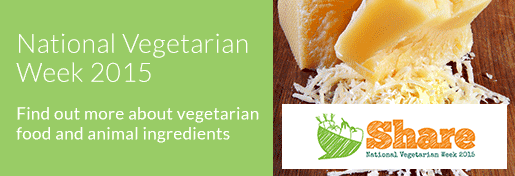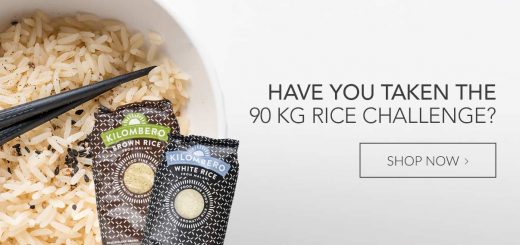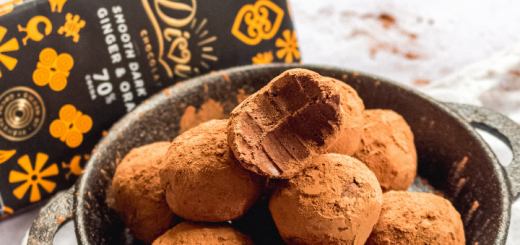Vegetarian Week tips – the hidden stuff

New vegetarians will of course know that they don’t eat meat products any more, but there are several common animal products in food and around the home that you or friends and family may not be aware of. There can also be some misunderstanding about what vegetarians do and don’t eat, from restaurant chefs to family members.
“So, do you eat fish?”
A person who follows a mainly vegetarian diet but eats fish is not a vegetarian – the proper term for them is pescetarian. It’s fairly rare these days to find a restaurant offering a fish course as the ‘vegetarian option’, but it has happened to me in the past and others have also assumed vegetarians eat fish, or forgotten about something like meat gravy or stock. A polite word is helpful, and you can usually get something cooked for you.
Vegans actually avoid all animal products, including eggs, dairy products and milk, honey, and non-food items like beeswax, wool, silk and leather. Many vegetarians also cut out leather and are conscious of reducing the amount of dairy and other animal products in their diet.
Gelatine/gelatin
Many a friend has been surprised to find out that seemingly innocent jelly sweets, marshmallows, desserts, treats and even low fat yoghurts aren’t suitable for vegetarians! But why? Well, many cheaper recipes typically include gelatine/gelatin, which is a setting agent made from animal bones, skin and tendons. (Even when I wasn’t vegetarian I really didn’t fancy eating that.)
Some vitamin, supplement or painkiller capsules can be made with gelatine, but many vegetarian-friendly brands are commonly available. You can ask your pharmacist if in any doubt or try great brands such as Terranova. On a related note, gelatine is also used to make paintballs, which I didn’t know but thankfully haven’t used.
Hydrolysed collagen can be found in some beauty products (particularly anti-aging or ‘wrinkle reducing’ creams or gels), and that’s another form of gelatin. It’s also known as collagen hydrolysate, collagen peptide, gelatine hydrolysate and hydrolysed gelatine. Animal tendons in my face cream? No thank you – there’s a massive range of cruelty-free and animal-free cosmetics and skincare out there, which ensures no animal products were used and no animal testing was involved. My personal favourite, Green People, have an amazing range of animal-free products that your skin will love instead. And no wrinkles here!
Gelatin substitutes for vegetarians:
Agar (sometimes written as ‘agar agar’) and carrageenan are extracts of seaweed, and can prove very useful in the kitchen in place of gelatine. Pectin is another substitute, found naturally in fruit and used very often in jam making. Konjac is an Asian plant, easily available nowadays and also used in zero-calorie noodles! Most products using these ingredients instead of gelatine will say ‘suitable for vegetarians’ (or vegans) on the label, but if in doubt ask the manufacturer or Google the ingredients.
Thankfully there are loads of great vegetarian-friendly sweets and treats out there, and we stock many of them in our Sweets section. Enjoy!
Isinglass – wine and beer
Made from the swim bladders of fish, commonly used as a fining agent for wine and beer, and not listed on the label. Many vegetarian and vegan-friendly beers and wines are available though – if in doubt, contact the shop or producer.
Animal rennet – cheese
Animal rennet is an ingredient taken from the stomach lining of calves. Most UK county cheeses are now made with rennet produced by micro-organisms and are entirely vegetarian. However, some imported cheeses aren’t suitable for veggies, including Parmesan, Grana Padano and Gorgonzola. Alternatives to most cheeses (for example, ‘parmesan style hard cheese’) are available, but remember to check with restaurants if you’re eating out. Vegan cheeses are available too, often made from cashew nuts!
Animal fat – suet and lard
Animal fat means fat taken from a dead animal, not butter. Suet and lard are types of animal fat, but vegetarian suet is easily available and quite widely used, for example in Christmas sweet mince pie filling. Many non-veggies don’t realise suet is an animal product, so let them know if they’re baking anything.
E-numbers
E120 is Cochineal/Carmine, this red colouring is isolated from crushed insects. Look for vegetarian-friendly alternatives such as natural beetroot colouring.
E542 – Edible Bone Phosphate, from animal bones.
E304 – Ascorbyl Palmitate, combination of the fatty acid palmitate with ascorbic acid occurs naturally in most fruits and vegetables. Palmitic acid is produced from fat, the main source is vegetable fat but it can be obtained from animal fat.
It’s not very often I come across sweets or products with these in, to be honest, so don’t worry that you’re going to have a lot to avoid. Check out The Vegetarian Society guide to e-numbers for a detailed list.
A full list of animal-derived ingredients from clothing to food is available from The Vegetarian Society – Veggie Aware Factsheet.
Many products go the extra step and get fully certified with the Vegetarian Society, and you can search their handy database of certified products. If you find a product wrongly labelled as ‘suitable for vegetarians’ or carrying a vegetarian logo, inform the Vegetarian Society who have successfully convinced manufacturers to change in the past.
— EDIT (27/5/15) – I forgot to mention that refined white sugar can be whitened with bone char, made from the bones of cattle. This is typically used in the USA and not in the UK, plus it doesn’t exist in the finished product so some people count it as a vegan or vegetarian product and are happy to eat it, but it’s one to be aware of for imported products. Thankfully, raw or unrefined sugars from the likes of Billingtons and Traidcraft are easily available, and even tastier. —
So is it hard to avoid all of these ingredients, as well as not eating meat? After 22 years of being veggie it’s second nature to be honest, although occasionally I find a product that I’m surprised still contains such things (M&S Percy Pigs, I’m looking at you – especially with the vegetarian version sat right next to it!) and I always check the label. In other countries I’ve had to do a little bit of Googling, say to find out what the Czech word for gelatine is on a packet of sweets! But these days there are so many great alternatives and everything from non-animal rennet to vegan ‘pleather’ or faux leather is easily found.
If you have any questions or queries, just drop us a line below and we’ll be happy to help find you an alternative. Happy National Vegetarian Week!




